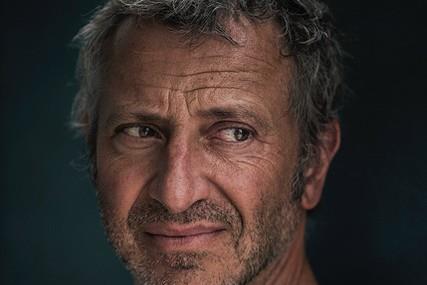
Belgian filmmaker Koen Mortier believe filmmakers have a responsibility to more than entertain an audience.
“Film has a social path to walk more than a cultural, and more than a superficial path,” he says. “I think the superficial has taken over quite a lot. But I believe the social part is one of the most important parts of film.”
He is hoping to make a social impact with his fourth feature Skunk, about a teenager who has been abused by his drug-addicted parents for many years, who is placed by social services in an institution with other troubled boys.
Mortier has been on a mission to make the film ever since author Geert Taghon, a social worker, sent him the book of the same name six years ago, with a note saying, “Every young kid has a story to tell. If there’s one person who can make a film out of this, it’s you.” Mortier says the book was “shocking because it’s all based on the truth.”
“It was an eye opener,” he says. “Because it’s actually a subject nobody ever talks about…It’s about how people are born in the wrong place, in the wrong family… Most of these kids cannot be helped. At some institutes, they say around 80% of the kids don’t get over [the trauma].”
He changed some of the plot of the book but knew it couldn’t be a Hollywood ending. “You cannot cheat people who are cheated their whole life, I knew we can’t invent a happier ending,” says Mortier, who tackled sensitive subjects in his past features Ex-Drummer, 22nd of May and Angel.
The director spent a lot of time in such institutions to interview managers, staff, teachers and children – which helped him to adapt the script – “I put their stories somehow in the back door of the character.”
He knew “it could not be a linear story” so decided to tell Liam’s past with the help of flashbacks. These show the horrors of his past but also show that he had a chance to ‘escape’ his family situation sooner but chose not to.
“No matter what these kids have been through, they still have a connection with their parents. They still want to go home,” Mortier explains.
Finding a way in
With such tough subject matter, he and his tireless producer Eurydice Gysel, also his partner in life and in Czar Film, had to apply for funding from Flanders Audiovisual Fund (VAF) and Netherlands Film Fund multiple times before the film could be greenlit. Co-producers are Frank Hoeve of Baldr Film) and Jean-Yves Roubin of Frakas).
No sales company is confirmed yet, but the film is now in post being readied for 2023 festivals and is being presented at this week Connext in Antwerp as a work in progress.
DoP Nicolas Karakatsanis shot on 16mm film but Mortier asked him to take a different approach to the one he used with Mortier on Angel. “Normally, I do a lot of preparation on a movie. My movies are very visual, but I wanted to avoid that.” Mortier explains. I just said to Nick, ‘We’re going to improvise. We’re going to shoot it like it’s a documentary. No fancy movements, as natural as possible.’ That was the main idea. We shot from the hip.”
He found his lead in Thibaud Dooms – who is studying acting in Amsterdam – “he’s a very gentle, nice, soft person and he was going to be working with these tough boys [the non-professional actors playing the other kids at the institution],” says Mortier. “All those kids together was a strange dynamic and the actor had to find his way in. It was the same for all the professional actors, they had to fit in with the kids, not to get the kids to fit in with them.”
The team undertook about 10 days of rehearsals and workshops before shooting, which was pivotal for personal bonding as well as preparation. “Because there was so much violence [in the script] everybody had to trust everyone. Because violence in cinema is all about trust,” says the director.
Of his approach with the young actors, Mortier says, “I try to be a kind of father on the set for them, but also I know when to leave them alone. But even now I try to see how they are doing, and how they feel. This shoot can be very physical, very emotional work, but somehow everybody understood to perfectly what they were doing. They were all friends. I even taught them all to play chess.”
Mortier is clear about his duty of care for his own actors and crew: “In scenes where there is emotional violence, it’s already heavy enough to put them in a fake situation. I would never risk anyone putting in a real situation. It’s not professional.”
























No comments yet